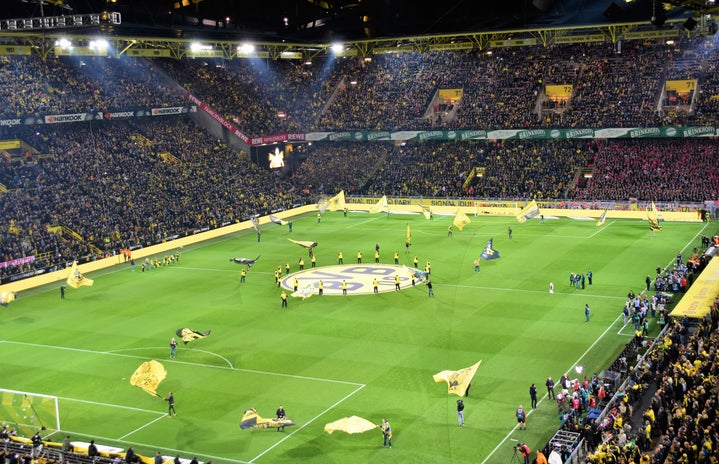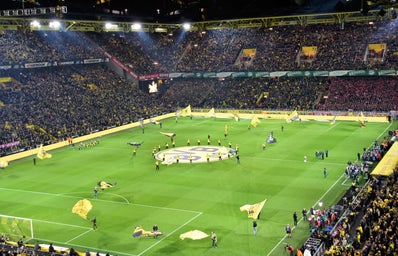TW: This article focuses on topics coming to light in Qatar due to the 2022 FIFA World Cup. Qatar is an Islamic country that requires certain laws and requirements based in religion. Therefore, some topics in this article labelled as “controversies” may be upsetting to those apart of the Islamic community. The thoughts expressed in this article are of the authors own opinion, and do not reflect those of Her Campus.
The 2022 FIFA World Cup has kicked off, with 32 teams from all around the world vying for the trophy that signifies who will be world’s new best soccer team. After four relentless years of training and dedication to the sport, many teams are presented with the opportunity to play and to honor their country and their name.
Underneath the heavy pressure and anticipation that lies within each game played, there are also several controversies that have arisen throughout the preparation. The 2022 World Cup is taking place in Qatar, a small country located in the Middle East whose political system is not commonplace. The country is still under a monarchy, and it has several laws implemented that could be considered to limit the freedom and expression of certain people. Below is a small run-down of what you need to know to be updated about controversies behind having the FIFA World Cup in Qatar.
Allegations of Corruption and Bribery
– When the decision to host the World Cup in Qatar was announced, it was a surprise to many fans as it beat out many other popular countries such as Japan, the USA, and Australia. It was also not very helpful that before the announcement of the countries projected to host, two executive members of FIFA were temporarily banned for offering to sell their votes. In 2014, an article reported on leaked emails and documents that suggested that one of the Qatari soccer officials and former FIFA executive members had allegedly paid millions of dollars’ worth of bribes to FIFA officials to vote for Qatar to host the Cup. After an investigation was undertaken, there were various irregularities in the bidding process, but not enough conclusive proof was found that proved Qatari officials had influenced the outcome of the vote.
– Even after several investigations were conducted by both the US and Switzerland into alleged wire fraud, racketeering, and money laundering with Qatar officials, not enough evidence was found to bring a significant answer to the people. Qatar officials have continued to deny wrongdoing, which means that the FIFA officials may proceed to make a load of financial gains rather than answer to the people in the name of justice and fairness.
Human Rights Abuse to the Migrant Laborers
– To keep the labor costs of building new stadiums for the thousands of people coming to watch the match down, Qatar relied on the labor of migrant workers. These migrant workers are employed through a labor system known as the kafala or a sponsorship system, which has workers tied to the job through a series of legally binding contracts. They are normally paid poorly, and they are tied to their contracts, in which they cannot change jobs or leave the country without permission (this was reformed in the late 2010s).
– As the system grew with the impending World Cup preparations, it was reported that more than 6,500 workers from other countries have died while working in Qatar. Several nonprofit groups reported that there was evidence of wage theft, excessive hours, and dangerous working and living conditions as well as physical/sexual abuse. With the hard work that the migrant workers have put into their survival, they should be able to work in the best and healthiest conditions without being exploited.
– The realization of Qatar’s government’s treatment of migrant workers has encouraged more people to look into forcing them to make reforms to its migrant labor system. The government has responded with some reforms (such as insurance and support funds for workers and a mandatory minimum wage), but many human rights groups believe that more is needed. People have believed having the World Cup in Qatar, regardless of the recognition of abuse, will ‘sport-wash’ fans. Sport-washing is the idea that repressive governments will use highly popularized sporting events to hide their international reputations.
– With this in mind, the awareness of the abuse is being covered up with the excitement and intensity of the games, with unimaginable issues lurking under the water.
Discrimination Against the LGBTQ2+ community
– Qatar has several severe laws in its penal code against the rights of the LGBTQ2+ community that can impose jail time on those who have sexual intercourse with someone of the same sex. There have also been reports of people in detention for this ‘crime’ who have received poor treatment. Although Qatar’s government has promised that all people are welcome in the World Cup, there have continued to be various underlying limitations.
– One of the biggest observations of Qatar’s government’s agenda against the LGBTQ2+ community was when FIFA threatened to issue yellow cards against all players who wore armbands that said ‘One Love’. Seven major European soccer teams were planning on allowing their team captains to wear these armbands as they signified support for minority groups such as the LGBTQ2+ community; that was before FIFA announced that they could face sporting sanctions. Afterwards, other armbands were used (one being the FIFA-sanctioned black armband that said ‘No Discrimination’).
– With this observation in mind, many fans of the LGBTQ2+ community have avoided attending any of the World Cup games in person. This is unfortunate; they shouldn’t have to worry about injustice when they are there to support their team and country. It should be the last thing on their minds.
Sustainability Issues:
– Several stadiums have been built in Qatar to accommodate the number of games occurring in the country. Six newly constructed stadiums were built, with one temporary one that will be deconstructed and repurposed afterwards. Organizers have proceeded to announce that because the World Cup is only for one month, the tournament will only release a month’s worth of emissions.
– But this underestimates the emissions coming from the tournament by at least 1.4 million tons. To offset these emissions, carbon offsets would need to be purchased (an action that compensates for the emission of carbon dioxide into the atmosphere, in which one would have to make up for that amount of emissions elsewhere). But according to public disclosures, the proper amount to account for the emissions released has not been purchased.
– On top of that, the money that is put forward to pay for the carbon offsets will normally go to new renewable energy projects. But in this instance, the money will be sent to a project that does not need it- therefore not making up for any emissions produced.
Nevertheless, the World Cup continued in spite of the controversy and injustice in the country of Qatar. Although it is far too late to turn back time, it is not too late to change the future. Hopefully, after the World Cup excitement has died down, a look into the possible reconstruction of the bidding circumstances, working conditions, and human rights can happen.
References:
https://www.cnn.com/2022/11/22/football/fans-qatar-world-cup-2022-spt-intl
https://www.vox.com/world/23450515/world-cup-fifa-qatar-2022-controversy-scandals-explained

